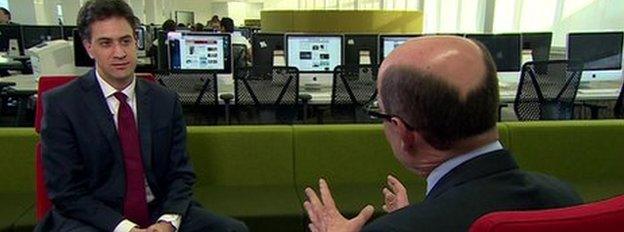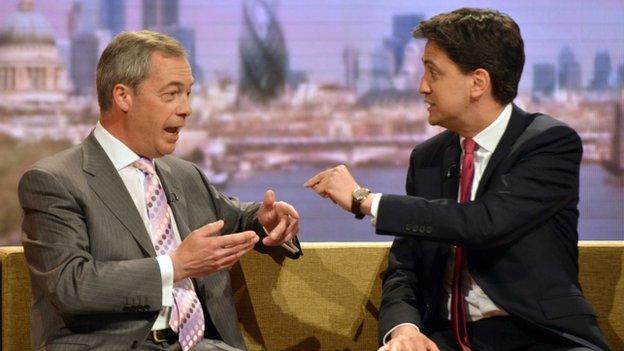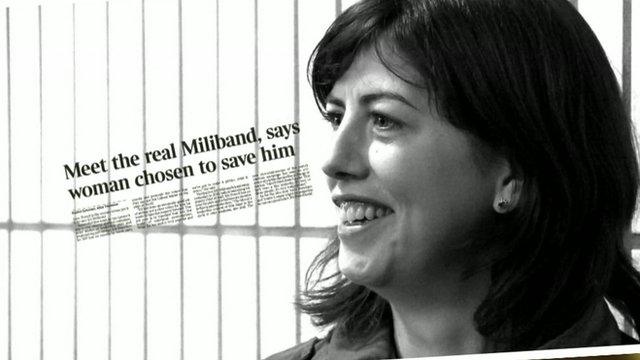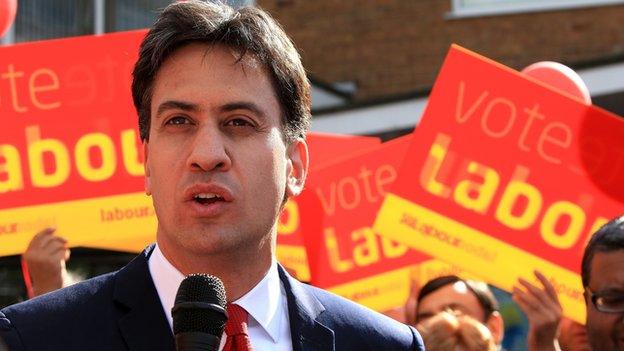Ed Miliband: I can absolutely be prime minister
- Published
- comments
Ed Miliband "absolutely" sees a prime minister when he looks in the mirror in the morning, he has told the BBC.
In an interview with BBC political editor Nick Robinson, the Labour leader admitted his "mettle had been tested" by reports that some Labour figures thought he should step down.
But he denied his leadership was a problem and said: "What doesn't kill you makes you stronger."
The Conservatives said Mr Miliband had not learned from "Labour's mistakes".
In a wide-ranging interview ahead of a speech at the University of London on Thursday, Mr Miliband said he was "not in the whingeing business" and that the pressure in his job was expected.
He added that "disunited parties are parties that the public worry about" and that the Labour Party would "go forward... united".
The BBC's Nick Robinson says the speech will inevitably be termed a "fight-back".
'Deeply sceptical'
In it Mr Miliband will say that Labour's economic plans will be delivered through "big reform" rather than "big spending".
"We will be the wealth creators, not just the wealth distributors; the devolvers of power, not the centralisers, and the reformers of the state, not the defenders of it."
A major theme will be the "zero-zero economy", which he said was about "people asking why they are on zero-hours contracts while those at the top get away with zero tax".

Ed Miliband tells Nick Robinson he has not thought of quitting
Analysis by BBC political correspondent Chris Mason
Whatever you might have seen, Ed Miliband wants you to know he is not going anywhere.
The Labour leader has endured an uncomfortable and damaging week, with some Labour MPs privately sharing with reporters their anxiety that his leadership is dragging the party backwards.
But he says he has a renewed determination to fight for everyday working people.
The gist of his pitch is this: the going is getting tough not because he is a loser, but because Labour's opponents fear he can win.
But whilst plenty of opinion polls have suggested Labour will win the election, recent ones have suggested the party's lead is narrowing or has vanished.
And Mr Miliband's personal ratings remain ropey.

Asked why the Labour Party was struggling, Mr Miliband said many people were "deeply sceptical about mainstream politics and whether it can solve their problems".
He agreed that "of course" he had people to convince in light of a recent poll indicating that 73% of people said they could not see him as prime minister.
But he said he had never thought of quitting and would spend "less time in Westminster and more time in the country, more time... taking my case to the British people".
He said it was "absolutely not" too late to change public opinion of him, and that the Labour Party had a "duty" and "responsibility" to win the 2015 general election.
Competing visions
Asked what qualities a prime minister needs, the Labour leader said: "You've got to be in touch with what people are feeling throughout the country".
"You can't be somebody that represents just a few people in society, which I believe that our prime minister, the current prime minister, is."
And he said a prime minister had to be "willing to fight" the "powerful forces" in society, such as "energy companies or banks".
But Mr Miliband also acknowledged a "harder electoral battleground" because of the rise of UKIP and the ongoing fallout of the independence referendum in Scotland.
Pressed as to whether Labour had been complacent about a UKIP threat, Mr Miliband said: "I don't see it that way."
He said voters were sceptical about politicians and accused Nigel Farage's party of wanting to "cut services even more than the Conservatives".

'Absolutely wrong'

Nick Robinson: "Some people in the party say to me: 'We like Ed Miliband, nobody doesn't like Ed Miliband, but it is set in concrete, the country's made its mind up, it's over, it can't be changed'."
Ed Miliband: "Absolutely wrong. This is an election we can win, this is an election I'm determined we win and I know we can with the vision we have for how we change Britain."

In contrast to Labour, he said, UKIP offered "a vision of the past."
In response to the comments, Mr Farage said the Labour leader was an "unelectable joke".
But Mr Miliband said that on immigration "instead of making promises we can't keep" a Labour government would introduce "practical policies that will make a difference".
"We can stop employers undercutting the minimum wage, recruiting just from abroad; we can say you should learn English if you're in a public-facing job; we can have longer controls on new countries coming into the EU."

The Labour leader will urge his party on Thursday never to try to "out-UKIP UKIP"
Mr Miliband said: "My fundamental belief is this is an unfair, unequal, and unjust country that works for only a few people at the top.
"I want to change Britain so it works for everyday people. That's what I'm about, that's why I stood for leader, that's what my policy agenda is about, that's what I'm going to fight for in the election."
Shadow health secretary Andy Burnham said there had not been a "shred of truth" in a newspaper story linking him with a leadership plot, calling it "pure fiction".
Andy Burnham MP: "Ed Miliband is fully in control"
Speaking on BBC Radio 4's Today programme, he said Mr Miliband had shown "courageous leadership" in the face of attacks from "vested interests" who didn't want Labour to win.
He added: "There has been a campaign in the last few days to destabilise and demoralise us.
"My message today is that it won't work, in fact it is going to galvanise us."
Conservative chairman Grant Shapps said of the Labour leader: "Ed Miliband's tenth relaunch does not cover up his failure to learn the lessons from Labour's mistakes.
"He has opposed everything we've done to turn our country around; he's failed to put forward an economic plan to secure Britain's future.
"Voters will view this latest effort with the same lack of enthusiasm that Ed Miliband's own colleagues view his leadership."
- Published12 November 2014
- Published9 November 2014

- Published11 November 2014
